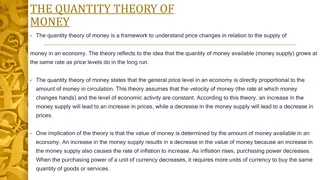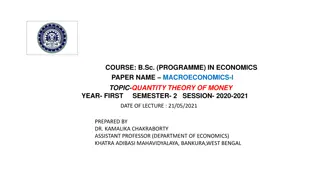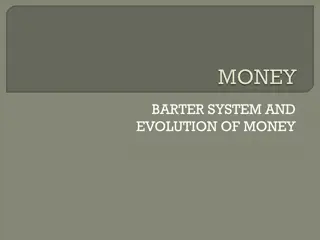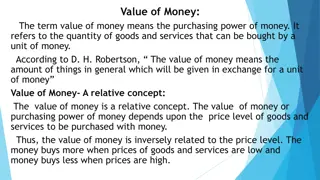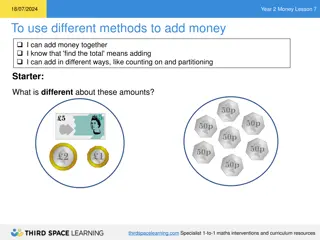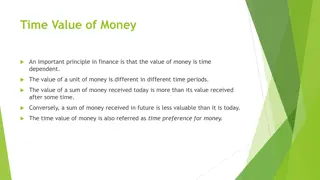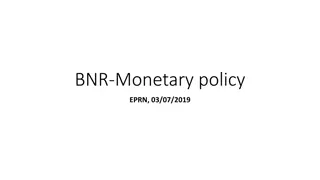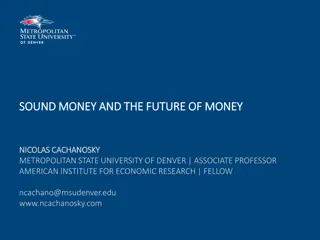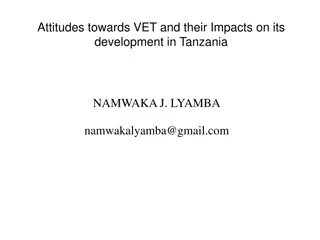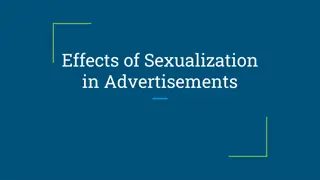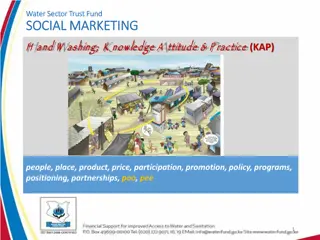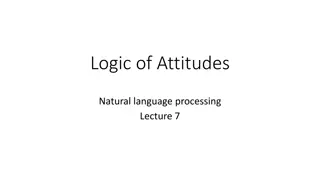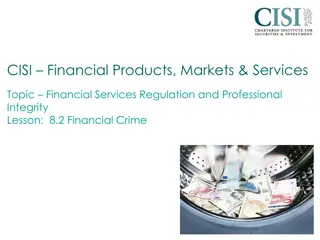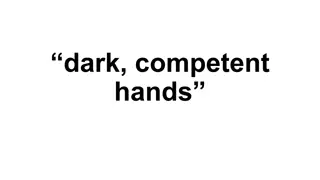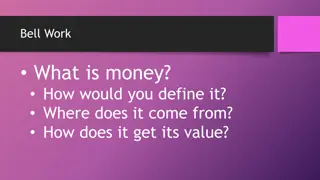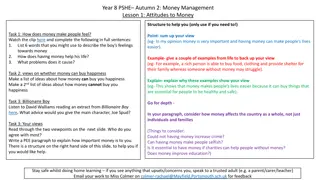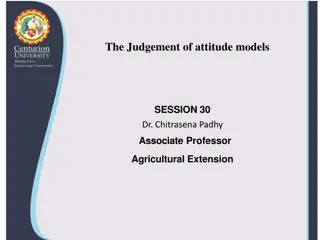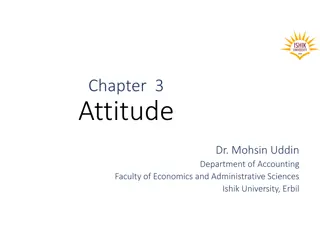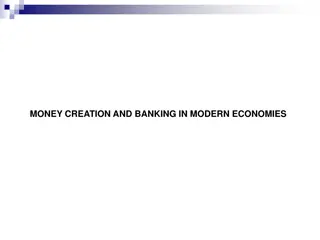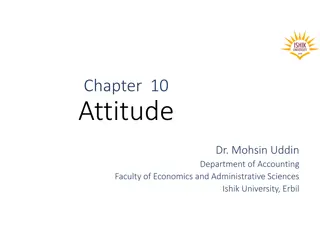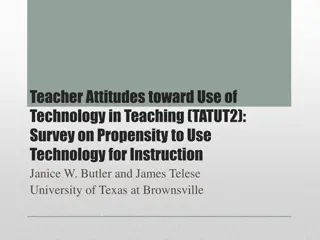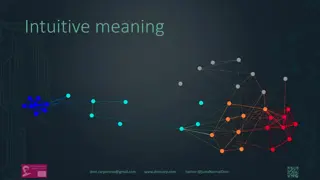Attitudes and Job Satisfaction
Attitudes play a crucial role in shaping our feelings towards objects, people, or events, influencing our behavior and job satisfaction. Components of attitudes include behavioral, cognitive, and affective aspects. Cognitive dissonance arises from conflicting attitudes or behavior. Major job attitud
1 views • 17 slides
The Quantity Theory of Money
The quantity theory of money posits a direct relationship between the supply of money in an economy and price levels, assuming a constant velocity of money and economic activity. Increases in the money supply lead to price inflation, devaluing currency and decreasing purchasing power. Two main versi
3 views • 6 slides
Attitudes Toward Sports Among Colonial Settlers in the New World
The attitudes of European colonial settlers towards sports in New England, the Middle Colonies, and the South were deeply influenced by their religious backgrounds. While Puritans in New England were generally against play, Quakers and Dutch Calvinists in the Middle Colonies were more accepting. In
0 views • 19 slides
Buy Fake Money Canada - undetectablecounterfeitbills.com
Buy Fake Money Canada, also known as prop money or play money, is currency that looks like real money but is not legal tender.\nText\/ WhatsApp: 1 (507) 544-8062\nEmail: info@undetectablecounterfeitbills.com\n
0 views • 3 slides
CAN YOU BUY COUNTERFEIT MONEY ONLINE - UNDETECTABLECOUNTERFEITBILLS.COM
The term \"counterfeit money\" describes counterfeit money that is created without official government approval and usually is an intentional attempt to mimic real money. The act of creating counterfeit money has a long history; the first instances can be found in ancient Greece and China. Contact:
1 views • 5 slides
The Quantity Theory of Money: Fisher vs. Cambridge Perspectives
The Quantity Theory of Money explains the relationship between money supply and the general price level in an economy. Fisher's Equation of Exchange and the Cambridge Equation offer different perspectives on this theory, focusing on money supply vs. demand for money, different definitions of money,
1 views • 7 slides
Evolution of Money: From Barter to Electronic Banking
Money has evolved from the barter system to electronic banking through various stages like animal money, metallic money, paper money, and credit money. The invention of money was crucial to overcome the limitations of barter, leading to the ideal utilization of resources and solving issues like the
0 views • 14 slides
Attitudes and Job Satisfaction in the Workplace
Attitudes play a crucial role in job satisfaction, with cognitive, affective, and behavioral components shaping how employees feel about their work. Major job-related attitudes like job involvement, organizational commitment, and job satisfaction influence employee behavior and performance in the wo
1 views • 49 slides
The Value of Money and Standards
The value of money refers to its purchasing power, which is influenced by the price level of goods and services. Different standards, such as wholesale, retail, and labor, help measure the value of money. Money can have internal and external value, affecting domestic and foreign transactions. The Qu
0 views • 62 slides
Money: Year 2 Lesson 7 on Adding Money Methods
Year 2 Money Lesson 7 focuses on using different methods to add money, such as counting on and partitioning. Students learn to find the total by combining amounts in various ways, including mixing notes and coins, differentiating values, and working with pounds and pence. The lesson includes activit
1 views • 26 slides
Time Value of Money in Finance
The time value of money is a crucial concept in finance, indicating the varying worth of money over time. It explains why receiving a sum of money today is more valuable than receiving the same amount in the future due to factors like investment opportunities, inflation, risk, and personal consumpti
0 views • 9 slides
Money and Monetary Policy in Economics
Money serves as a medium of exchange, store of value, and unit of account in an economy. It is vital for economic transactions and stability. The quantity of money is measured using concepts like liquidity and monetary aggregates. The demand for money is linked to the Quantity Theory of Money, which
2 views • 12 slides
Analyzing Attitudes towards Childcare in Source A and B
Explore and compare the different attitudes and methods used by two writers in conveying their perspectives on childcare, supported by relevant quotations. Question 4 prompts an in-depth analysis of language, tone, structure, and sentence types employed to convey attitudes. It builds upon the skills
0 views • 12 slides
Sound Money and the Future of Money by Nicolas Cachanosky
Sound money ensures monetary equilibrium where money demand equals money supply, essential for a stable economy. Explore the evolution of monetary institutions, cashless economies, and cryptocurrencies with Professor Nicolas Cachanosky's insightful perspective on the future of money.
0 views • 27 slides
Money: Functions, Properties, and Importance
Explore the essential aspects of money, including its functions as a medium of exchange, standard of value, and store of value. Discover the key properties of money such as durability, portability, divisibility, economic stability, scarcity, and acceptability. Uncover the historical evolution of mon
0 views • 11 slides
The Privacy Paradox: Attitudes vs. Behaviors
Social scientists have identified a Privacy Paradox where individuals with strong privacy concerns may not always engage in behaviors that protect their privacy. While some studies show a discrepancy between attitudes and behaviors, others suggest that privacy-concerned individuals do employ privacy
0 views • 14 slides
Attitudes of PGDE Teachers Towards the Teaching Profession: A Study
Attitude plays a crucial role in a teacher's performance. This study investigates the attitudes of Post Graduates Diploma in Education (PGDE) teachers towards the teaching profession. Findings show that while attitudes related to academic responsibility, social recognition, and professional satisfac
0 views • 8 slides
Attitudes Towards VET and Its Impacts on Development in Tanzania
Attitudes towards vocational education and training (VET) in Tanzania and their impacts on its development are explored in this paper. Starting with the historical context of VET in Tanzania, the study discusses the evolution and current status of VET, highlighting challenges and attitudes towards i
0 views • 43 slides
Effect of Sexualization in Advertisements on Viewer Memory and Brand Attitudes
This research project aims to investigate how sexualization of female models in advertisements impacts memory recall and viewer attitudes towards the brand. The study defines sexualization based on the attire of the model in the ad and will measure memory recall and viewer attitudes using specific c
0 views • 29 slides
Promoting Hand Washing for Better Health: Knowledge, Attitudes, and Practices
Understanding the importance of hand washing is crucial for preventing the spread of germs and diseases. This content emphasizes the knowledge, attitudes, and practices related to hand washing, highlighting key factors such as when, where, and how to wash hands effectively. It delves into common att
0 views • 6 slides
Money Management and Financial Literacy Lesson Activities
This lesson covers various aspects of money management and financial literacy through activities such as listening exercises, reading passages, working with idioms, and role-playing scenarios. Topics include saving money, spending habits, credit cards, income levels, and attitudes towards wealth. St
0 views • 13 slides
Propositional and Notional Attitudes in Logic and Natural Language Processing
Explore the intricate concepts of propositional and notional attitudes in the context of logic and natural language processing. Dive into the distinctions between belief, knowledge, seeking, finding, solving, wishing, and wanting within the realms of individual intensions and hyper-intensions. Under
0 views • 16 slides
Money Laundering Regulations and Professional Integrity in Financial Services
Money laundering is the process of disguising criminal proceeds to make them appear legitimate. This illicit activity involves three stages - placement, layering, and integration. International cooperation is essential in combating money laundering, with organizations like the Financial Action Task
0 views • 9 slides
Analysis of Word Choices and Attitudes in Literary Texts
The provided content delves into the representation of characters through word choice and attitudes in various literary texts. It examines the implications behind phrases like "dark, competent hands" and "Mandy got her degree, did she? Dog my cats", shedding light on underlying biases and perspectiv
0 views • 16 slides
Evolution of Money: From Barter to Fiat Currency
The evolution of money traces back to barter economies where a mutual coincidence of wants was necessary for trade. Settlers in Colonial America used commodity money and fiat money, with specie coins becoming popular due to their mineral content. The term "dollars" originated from the German pronunc
0 views • 60 slides
Difference Between Capital Market and Money Market: A Comprehensive Overview
The capital market and money market serve different purposes in the financial world. While the capital market provides funds for long-term investments in securities like stocks and debentures, the money market deals with short-term borrowing and lending of funds. The capital market acts as a middlem
0 views • 4 slides
Attitudes and Influence in Behavior Formation
Attitudes are influenced by various factors such as experience, social roles, conditioning, and observation. They can be learned through classical and operant conditioning and by observing others. However, attitudes do not always align with behavior. Factors influencing attitude strength include exp
0 views • 16 slides
The Impact of Attitudes on Teaching Profession in Contemporary Education
The changing nature of the teaching profession in the contemporary era has led to shifts in teachers' attitudes towards their work. Attitude is viewed as a state of preparation for action, affecting behavior and social interactions. Various scholars have defined and studied attitudes as internal sta
0 views • 20 slides
Gender Attitudes in Southern Africa
The Gender Progress Score (GPS) survey collected responses from 15 countries in Southern Africa between 2019 and 2021 to gauge gender attitudes. With a total of 34,323 responses, the survey revealed insights on gender attitudes, with women comprising 49.5% of respondents. The scores ranged across th
0 views • 18 slides
Money Management Lessons for Year 8 PSHE Students
Explore attitudes towards money, learn about budgeting, and consider the impact of money on happiness and life choices in this comprehensive PSHE lesson for Year 8 students. Activities include analyzing feelings towards money, discussing the relationship between money and happiness, budgeting hypoth
0 views • 9 slides
Workplace Safety Awareness: Key Attitudes and Preventive Measures
Understanding the critical importance of safety in overhead line maintenance, this content highlights key attitudes towards safety, the causes of accidents and injuries, and ways to prevent them. Emphasizing the need for a safety-conscious mindset and proactive measures, it underscores the responsib
0 views • 14 slides
Contemporary Representational Models of Attitudes
Fazio's representational model posits that attitudes are stored as summary evaluations associated with objects, influencing accessibility and behavior. Existing attitudes impact the assimilation of new information, though specific processes remain unelaborated.
0 views • 8 slides
Attitudes: Components and Impact on Life
Attitudes play a significant role in our perception and behavior towards people, objects, and situations. This content covers the definition of attitudes, their formation, components (cognitive, affective, behavioral), and the impact of a positive attitude on one's life. By understanding attitudes,
1 views • 30 slides
Money Creation and Banking in Modern Economies
This content delves into the concepts of money creation, banking, balance sheets, assets, liabilities, equity, central bank reserves, credit money creation, credit money destruction, cash, different types of money, as well as risks for banks. It covers various aspects of modern banking systems and t
0 views • 24 slides
Early Childhood Educator Attitudes to Giftedness Research Overview
Early Childhood Educator Attitudes to Giftedness and Early Entry research by Mimi Wellisch, PHD, explores the impact of gifted training on educator attitudes. It discusses the evolution of attitudes, training in giftedness, and regulation requirements for young gifted children in NSW. The research c
0 views • 33 slides
Developing Positive Global Attitudes in TNE Environment Towards Global Graduates
This study delves into fostering positive global attitudes in a Transnational Education (TNE) setting as a crucial step towards cultivating global graduates. Key themes include knowledge of others, global issues, communication, collaboration, reflection, and attitudes like openness to diverse cultur
0 views • 24 slides
Attitude
Attitudes play a crucial role in shaping our perceptions and behaviors towards people, objects, and situations. This content delves into the definition of attitudes, components, formation, and potential for change. Exploring cognitive, affective, and behavioral aspects of attitudes helps in understa
0 views • 28 slides
Teacher Attitudes Towards Technology Integration
To examine teachers' attitudes towards technology integration in teaching, focusing on the impact of technology on education and the importance of engaging students digitally. The role of teacher attitudes as a significant barrier and the development of surveys to understand these attitudes are high
0 views • 19 slides
Definition of Money and Its Functions
Money plays a crucial role in the economy as a medium of exchange, unit of account, and store of value. Understanding the different types of money from commodity money to fiat money helps in grasping how societies have evolved in their monetary systems.
0 views • 49 slides
Attitudes and Neutrality in People
Attitudes and neutrality play crucial roles in shaping interactions among individuals and groups. The images presented delve into the intricate connections between attitudes, partisanship, and the concept of neutrality. Highlighting the dynamics of how attitudes are linked and the impact on polariza
0 views • 12 slides

